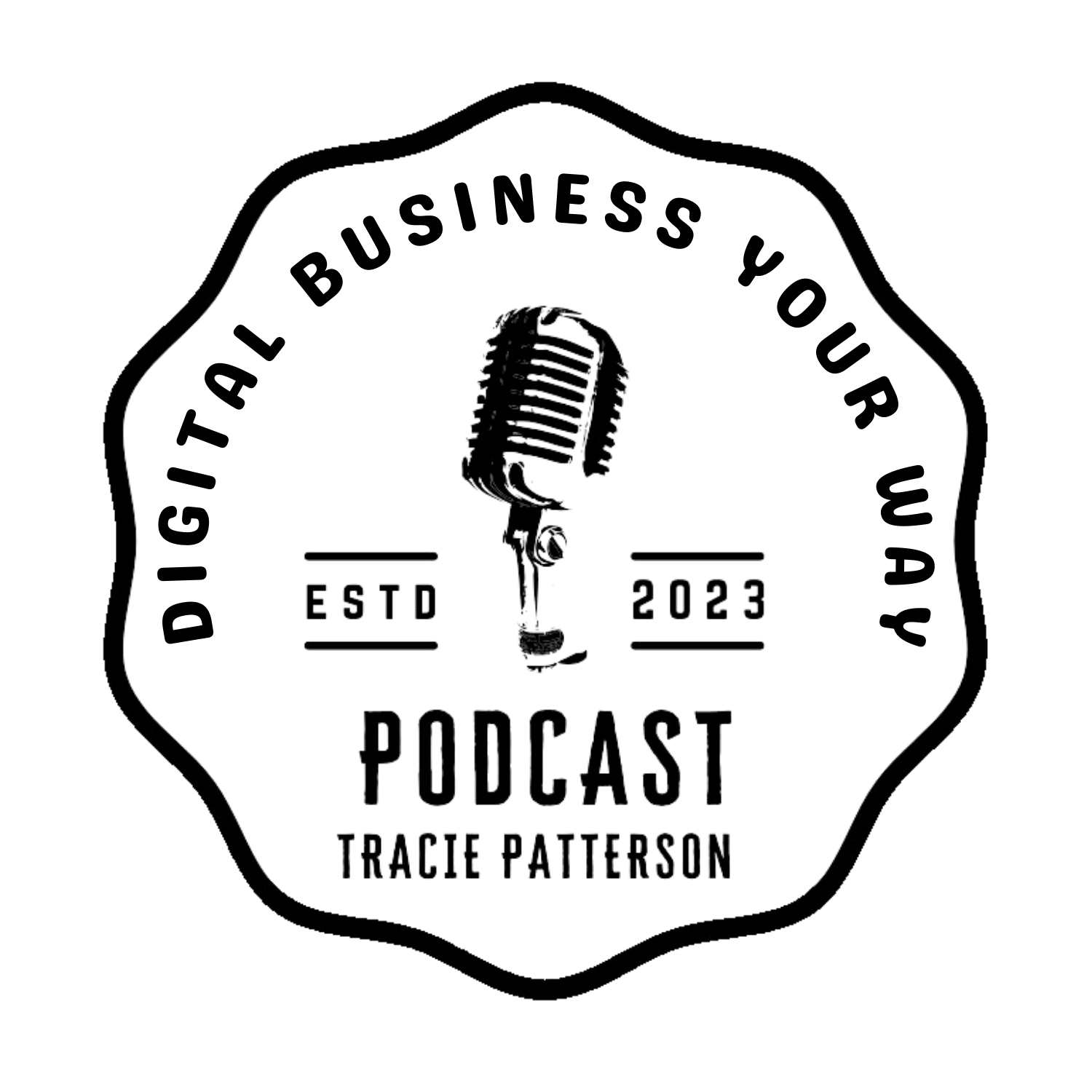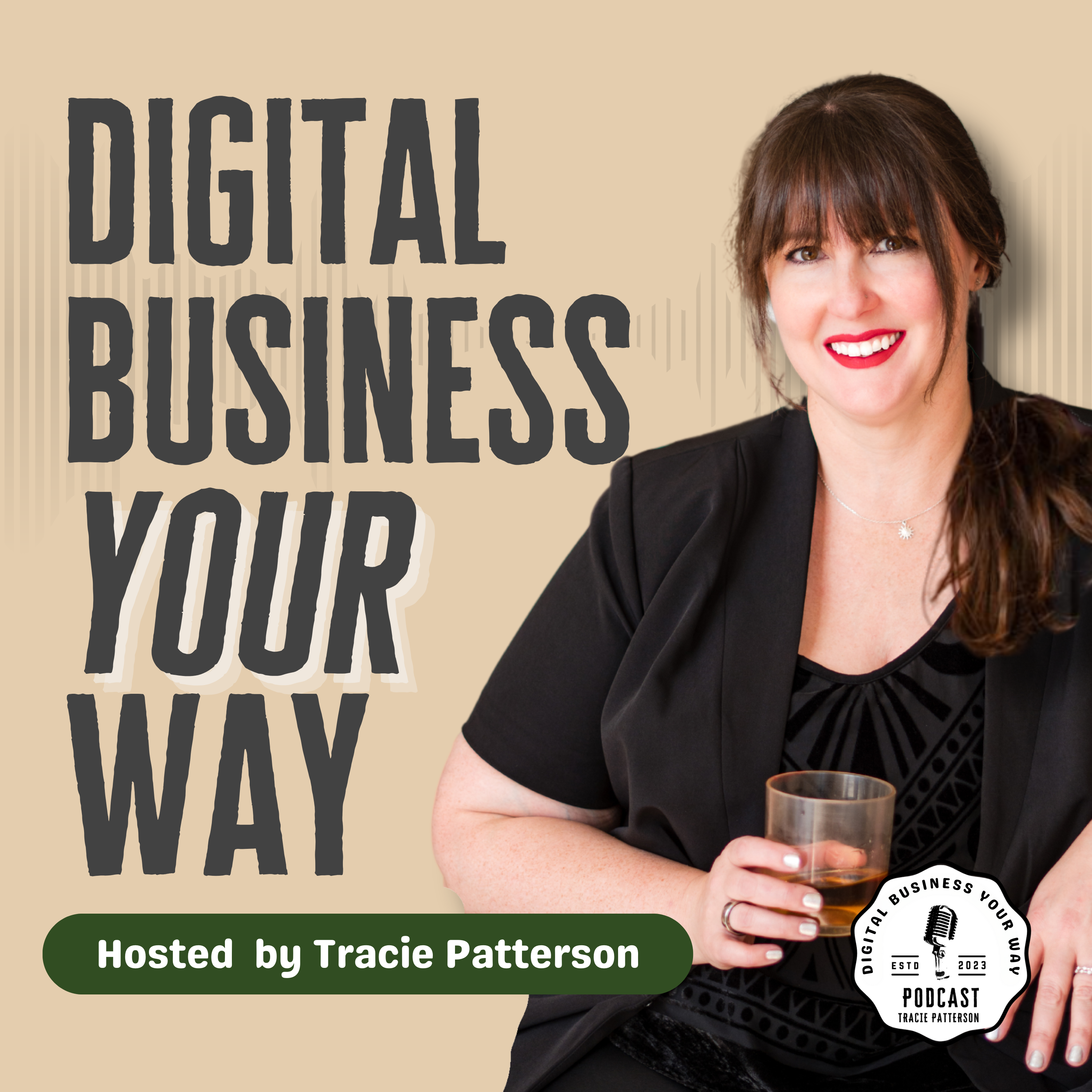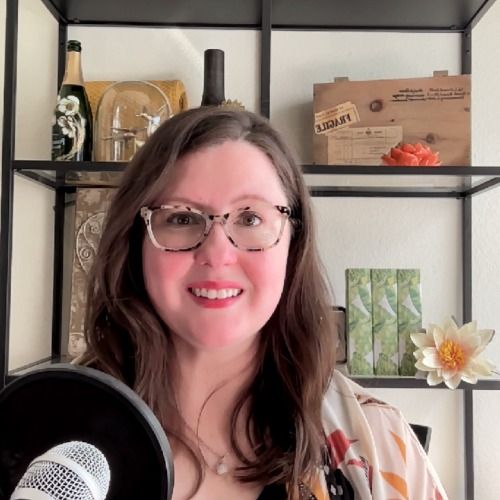Episode 16
Adapting to Buyer Behavior: Building a Resilient Offer Stack that Builds Client Loyalty & Growth
Adapting Your Online Business to Changing Buyer Behavior
In this episode of 'Cocktails, Coffee, and Conversation™,' Tracie discusses how business owners can adapt to changing buyer behavior by diversifying their offer suite, implementing effective pricing and sales mechanisms, and retaining current customers with loyalty programs. She provides actionable strategies to create a sustainable and viable business. Tracie also highlights the importance of aligning your pricing, offer structures, and sales tactics with your business's unique needs and capacities, avoiding trends that may not serve your goals. She invites listeners to explore further resources like her course 'Audience to Client™' and her program 'Boost the Value of Your Offer in a Day™' for more detailed guidance.
00:00 Introduction to Changing Buyer Behavior
01:42 Understanding Offer Structure
03:12 Diversifying Your Offer Suite
07:04 Pricing and Sales Mechanisms
11:17 Retaining Current Clients
12:51 Conclusion and Next Steps
A resources from our host:
Got a question or comment?
Want Tracie's best trainings or to find out more?
www.traciepatterson.com/connection
Interested in Audience to Client: Create a Lead Magnet Built for Sales
Want to learn more about Boost the value of your offer?
www.traciepatterson.com/boostoffervalue
CREDITS
Music ColourfulSounds
Podcast Editor Maia McLachlan
Transcript
Hello.
2
:Hello and welcome to cocktails,
coffee and conversation.
3
:Tracie here.
4
:And today we're continuing our
conversation on what we can
5
:do as business owners when we
notice changing buyer behavior.
6
:Because remember, it's not that
people aren't buying at all it's
7
:that they're buying differently.
8
:Yeah.
9
:So how you can set your business up to
be ready for these economical cycles.
10
:Because they will happen at various times
to various extents in our businesses.
11
:Especially since we do business
internationally, it's really important.
12
:Right?
13
:And it sets you up for that
longevity and to make you a
14
:sustainable and a viable business.
15
:Back in episode 14, I talked about
how this is a natural evolution
16
:of a growing market and how using
details' differentiators and
17
:loyalty markers can breed longevity.
18
:And set your business apart
in the long run for success.
19
:But what about your offer structure?
20
:What can or should you do
about your offer stack?
21
:Especially if you keep hearing
trendy ideas around offer
22
:types or prices to charge.
23
:Remember in part one, when I asked
to what degree are you truly spending
24
:less versus paying more attention to
what you are spending your money on.
25
:Both in your business and in
your personal life like chicken
26
:example, buying that at a store.
27
:It's not that you aren't
buying a source of protein.
28
:It just might look different than
it did before you might be buying
29
:a different cut, a quantity brand.
30
:You might be going to a different
store, getting it from a different
31
:source or just buying a different
type of protein altogether.
32
:Regardless.
33
:You're still getting something.
34
:Yeah.
35
:Well, in addition to that example, helping
you draw on daily life to see into your
36
:business, it helps ground your experience
with business emotions and decisions.
37
:And also serves as a tangible
way to see all the different
38
:ways you can buy chicken.
39
:Or, you know, fill in the blank
on your protein preference.
40
:Think about the different packaging
brands, the cut mixes fresh
41
:versus frozen whole versus parts
value packs and on and on and on
42
:that, you know, protein comes in.
43
:It's a lot.
44
:Right.
45
:And like protein, you to have many
different ways you can package up
46
:what you sell and how you do it.
47
:Where you compromise, it's
a signal to your audience.
48
:So let's talk about the three pieces
to look at within your offer stack.
49
:One would be diversifying
your offer suite.
50
:Another one would be the sale and
pricing options you have to play with.
51
:And the third we'll talk about
today would be how are you keeping
52
:the people that you currently have?
53
:So this first one,
diversifying your offer suite.
54
:This may or may not be how you've
heard this phrase before, but to
55
:jargon bust, you want to have more
than one way to bring in money.
56
:So you aren't reliant on
one way people can pay you.
57
:Yeah.
58
:This can be different product types.
59
:That's digital product service packages.
60
:Coaching offers.
61
:This can also be different pricing bands.
62
:That's where you hear the
low, the medium, the high.
63
:And w what that number ends up being
that's determined by the market.
64
:You're in.
65
:Right.
66
:Now you don't have to have all of them.
67
:And it doesn't have to be complicated, but
it does need to serve you and your people.
68
:Because it's not about following
a trend when diversifying and
69
:creating a product or setting a
new price, because it's popular.
70
:It's about what sets you up to
showcase your work, to get results
71
:for your people and to bring in
the money the business needs.
72
:You have options here.
73
:Some we have explored it even
on this show, like adding VIP
74
:upsells or creating low tickets.
75
:And some we haven't touched on
yet, but I cover all of this
76
:extensively with my coaching clients.
77
:But again, it's not about choosing
an $11 product because it's
78
:popular or creating a mini course
because someone said to try it.
79
:Okay.
80
:When you're curious, and you do
want to experiment with something.
81
:It's important to ground that curiosity.
82
:In what is right for your business?
83
:And looking at the cross section
of what your people need with what
84
:you have the capacity for, then
you assign the dollar amount, or
85
:then you assign the product type.
86
:After you've created it
for your people first.
87
:Along with your interest in your capacity.
88
:Okay.
89
:We flip it around.
90
:Yeah.
91
:We don't think about, I
want to make $11 products.
92
:What should I make?
93
:No, instead it's I want to make
this for the people to get this.
94
:Now let's create it.
95
:What should it be priced?
96
:What should it be called?
97
:What container should it be in?
98
:Okay.
99
:In my course, audience to client.
100
:I walk you through all of this beautifully
and I will link to that in the show notes.
101
:because it is available on demand.
102
:In it, I show you how to apply the
framework for creating freebies,
103
:but the guiding questions and
the framework itself is actually
104
:for any offer at any price point.
105
:So I'm going to talk about
a couple of those right now.
106
:Cause the guiding principle to start with
is understanding whether you are helping
107
:different people through the same stage.
108
:Or the same person through all the stages
they go through during a single process.
109
:Okay, sit with that difference for a bit.
110
:Because this decision is key to creating
what your people need from you now.
111
:And when you couple that with what you
have the capacity and the excitement
112
:to create no amount of trendy ideas
off the interwebs will distract you.
113
:Rather you'll be able to celebrate
others' abilities to experiment.
114
:And you're like, oh, well, that's
so cool that they're trying $27
115
:product or that they've decided
to do a whole bundle of workshops.
116
:I'm going to stay over here where
I'm doing what I'm excited about
117
:and I'm going to keep going.
118
:Because as we know, consistency is
the real key to business success.
119
:And having something you
love and are excited about.
120
:That's that big win that's
that momentum builder.
121
:That's giving you the opportunity to
get massive amounts of testimonials
122
:and showcasing all of those results
and all those wonderful things.
123
:Right.
124
:Versus jumping from trend
to trend, to trend to trend.
125
:Okay.
126
:So, what do you currently have for sale?
127
:And what products could be added that will
bring value and results to your people.
128
:Then on the money side, let's talk about
sale and pricing options available to you.
129
:Pricing inflation and personal
situations will always vary, but
130
:ground in what you know about you.
131
:And your people to make decisions.
132
:There's nothing wrong with flash sales or
creating light versions of your packages,
133
:as long as they're still a result to
point to that people actually want.
134
:Yeah.
135
:And there's nothing wrong with
trying something new as long as
136
:you do it from the right place
and not out of a fear response.
137
:Think of pricing and sales
mechanisms and categories.
138
:Okay.
139
:A price has set market.
140
:Value.
141
:And an introductory pricing.
142
:You have a set price for your offer?
143
:This is the advertised price based on the
built in value of what you were selling
144
:and often changes over time, then settles.
145
:Meaning, it stays that way
for a long period of time.
146
:This is when you create something new.
147
:So you sell it at an introductory
low price to get people in, to
148
:prove the concept, to refine it,
gained feedback testimonials.
149
:Then raise the price
and repeat that process.
150
:Until it.
151
:Gets to it's a settled price point.
152
:Where the value built in based on
the results people are actually
153
:getting matches its market value.
154
:Yeah.
155
:At that point, the price
typically doesn't increase again.
156
:Unless the value built into the offer.
157
:Increases as well.
158
:Right.
159
:So unless you're adding more to it,
unless you are updating the material,
160
:unless you're changing, what's in it.
161
:Then typically you don't actually
change the price once it hits that,
162
:that sweet spot, that match to match.
163
:Okay.
164
:Whereas the other category that's
sales mechanisms, that's your flash
165
:sales, your bundles, your bonuses,
your giveaways, all of those kinds of
166
:temporary ways to entice urgency and
give people a reason to jump in now.
167
:They create excitement.
168
:They build momentum and
noise around an offer.
169
:They show off the amazing results
past clients have gotten and gives
170
:people a great opportunity to join.
171
:And I include bonuses in this
list because you don't have
172
:to decrease what someone pays.
173
:To entice them to buy now.
174
:Right.
175
:Let's go back to that chicken example.
176
:And thinking about the packets of
meat at a store, have you seen those
177
:wrapped fresh cuts that say extra 20%?
178
:It's the same price as a regular pack.
179
:Well, which one do you choose when
you're looking for a value by.
180
:The one where you get more for the same
cost that you would already budgeted for.
181
:As opposed to just the one
where you get what you were
182
:expecting, but it costs less.
183
:Yeah.
184
:And think about which
one seems more exciting.
185
:And also think about
at which time does one.
186
:Mechanism matter more than the other.
187
:Right, because there's some times
when you wish that you could get in
188
:on that 20% extra, but you have to
go for the cheaper option regardless.
189
:And this is why we look at all
of these separately and we plan
190
:out these opportunities and we
list them out in our business.
191
:And we think about
where are our people at?
192
:Where are we at in our business?
193
:And where does that match
with what we've got going on?
194
:Because it's important
to keep these ideas.
195
:Of our set price.
196
:Versus our sales mechanisms separate
because when we worry about revenue
197
:being low and we think about the ways
to get people, to buy, reducing our
198
:prices, often that initial idea, right.
199
:It's kind of that, that panic button.
200
:But we have to think.
201
:Are you looking to mess
with your set price?
202
:Or are you actually thinking
of a temporary change in
203
:price to mess with urgency?
204
:It's also important to make this
list of the right options for your
205
:audience and your business when you're
outside the emotion of the situation.
206
:So you can call on that
list when you're having.
207
:All of the feels.
208
:Now, if you're already in all
of those feels, I don't want
209
:you to delay making the list.
210
:Right.
211
:But I will caution you to take extra
care and to review that list and give
212
:it some space and time to breathe before
deciding what to act on right now.
213
:Okay.
214
:So that, that third mechanism that
we have, well, that's keeping the
215
:people that are already with you.
216
:Right.
217
:So how are you wowing and celebrating
the people who work with you now?
218
:Are you offering them loyalty offers
like alumni rates or private sales.
219
:Invite only offers or
continuation bonuses.
220
:This can be for clients, students,
people on your email list.
221
:There's lots of exclusive groups you can
give special attention to and special
222
:access to that will create loyalty.
223
:And get them excited to
join your next thing.
224
:Map out what you are doing
and where there are some gaps.
225
:Look at what people are taking you up
on and what they're not bothering with.
226
:What they do and don't know about.
227
:Where there's opportunity to
give more and to ask them.
228
:If there are some things
that people aren't grabbing.
229
:Ask, what would =you
actually be interested in?
230
:Do a survey, get some feedback, find out
their level of awareness and interest.
231
:List out all the places people
can find out about these perks.
232
:And how often you're
actually sharing them.
233
:Not just in recordings or at the
bottom of an email or as a note in
234
:a lesson at the end of a module.
235
:But in all of those places,
And telling people that they
236
:are in all of those places.
237
:Okay.
238
:Is it using diversity in your offers?
239
:And the right pricing structure with
sales mechanisms and wowing, the
240
:people who already work with you.
241
:are key pieces to keeping your
offer stack, ready to respond
242
:to changing buyer behavior.
243
:And if you're wanting support, figuring
all this out, like naming the details
244
:and how to share them, understanding
pricing, and seeing where you already
245
:are, wowing people and where you
can, wow them more jump into boost,
246
:the value of your offer in a day.
247
:Boost is one of a kind program that
gives you a left-brained loving
248
:workflow and structure to see
the ins and outs of your offer.
249
:As it is now.
250
:Plus what it can be.
251
:And how to get it where you want it.
252
:Then it kicks off your creative
right brain and get you writing
253
:out the best sales messagings.
254
:So you know exactly how to talk about
this offer to your dream clients.
255
:So they're excited and asking to join you.
256
:You get instant access to the
full program and you can use this
257
:process over and over again on
any offer you want to supercharge.
258
:It is worked for hundreds
and it can work for you too.
259
:The link will be in the show notes, but
it's also Tracie patterson.com/boost.
260
:Offer value.
261
:You've got this, I believe in you.
262
:And I'm also here for you.
263
:Until the next episode be
well and have some fun.





